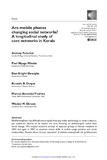| dc.contributor.author | Palackal, Antony | |
| dc.contributor.author | Mbatia, Paul Nyaga | |
| dc.contributor.author | Dzorgbo, Dan-Bright | |
| dc.contributor.author | Duque, Ricardo B | |
| dc.contributor.author | Ynalvez, Marcus Antonius | |
| dc.contributor.author | Shrum, Wesley M | |
| dc.date.accessioned | 2013-06-24T12:49:26Z | |
| dc.date.available | 2013-06-24T12:49:26Z | |
| dc.date.issued | 2011-05 | |
| dc.identifier.citation | New Media & Society May 2011 vol. 13 no. 3 391-410 | en |
| dc.identifier.uri | http://erepository.uonbi.ac.ke:8080/xmlui/handle/123456789/39030 | |
| dc.description.abstract | Mobile telephony has diffused more rapidly than any Indian technology in recent memory, yet systematic studies of its impact are rare, focusing on technological rather than social change. We employ network surveys of separate groups of Kerala residents in 2002 and again in 2007 to examine recent shifts in mobile usage patterns and social relationships. Results show (1) near saturation of mobiles among both the professionals and nonprofessionals sampled, (2) a decrease in the number of social linkages across tie types and physical locations, and (3) a shift towards friends and family but away from work relationships in the core networks of Malayalis. We interpret these findings as support for the bounded solidarity thesis of remote communication that emphasizes social insulation and network closure as mobiles shield individuals from their wider surroundings. | en |
| dc.language.iso | en | en |
| dc.title | Are mobile phones changing social networks? A longitudinal study of core networks in Kerala | en |
| dc.type | Article | en |
| local.publisher | Department of Sociology and Social Work | en |

